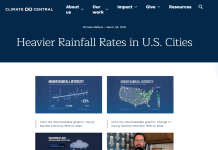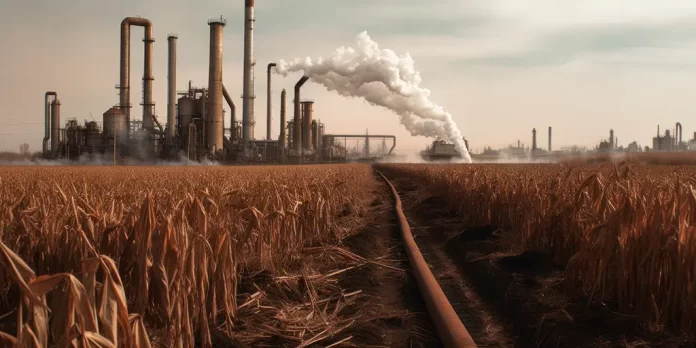Editor’s Note: Among the really egregious policy grifts politicians and politically connected green energy profiteers have developed to profit from fears of climate change is the idea of Carbon Capture and Storage (CCS). Under that scheme, carbon dioxide generated during hydrocarbon production and use is captured before it can be released into the atmosphere, and is then stored underground. As explained in Climate Change Weekly recently, different parties benefit from government CCS promotion in different ways, but the result for climate and the public is always the same – higher energy costs and no impact on the climate.
The Heartland Institute recently released a study, Carbon Capture & Property Rights, examining the myriad costs and dangers to health and private property threatened by large scale government efforts to promote carbon capture and storage. It seems, as discussed in the guest post below, in some states the public is getting the message; coming out to tell public officials that they should not endorse CCS, nor allow companies profiting from it to be allowed to use eminent domain to take private property to further their private interests.
Guest Post by Makenzie Huber of South Dakota Searchlight via ESG University.
Hundreds of people, many of them opponents of a carbon dioxide pipeline, filled the Southeast Technical College auditorium Wednesday evening for a state Public Utilities Commission hearing regarding a second attempt by Summit Carbon Solutions to gain a permit for the project.
“We know this is an incredibly important issue to you,” said Commissioner Gary Hanson at the start of the three-hour meeting. “We are here today to learn and listen, and we appreciate each of you being with us today to give us your input.”

Hundreds of people fill the Southeast Technical College auditorium in Sioux Falls for a Public Utilities Commission hearing about a carbon dioxide pipeline proposal on Jan. 15, 2025. (Makenzie Huber/South Dakota Searchlight)
The Iowa-based company plans a 2,500-mile, $9 billion pipeline to capture carbon dioxide from 57 ethanol plants across five states, including eastern South Dakota, and transport it to North Dakota for underground storage. The project would capitalize on federal tax credits incentivizing the prevention of heat-trapping carbon emissions.
The commission rejected Summit’s first permit application in 2023, in part due to the pipeline route’s conflicts with local ordinances mandating minimum distances between pipelines and existing features.
The project has a storage permit in North Dakota and route permits in North Dakota, Iowa and Minnesota, while Nebraska has no state permitting process for carbon pipelines. The project also faces litigation from opponents in multiple states.
The Sioux Falls meeting focused on residents in Minnehaha, Lincoln, Turner and Union counties. The commission held another meeting in Mitchell earlier in the day.
Most of Wednesday’s attendees opposed the pipeline — evident by applause often filling the room after opponents spoke. The opponents who spoke primarily reiterated concerns about safety and impacts to farmland affected by the pipeline’s planned route, which were raised during the company’s initial attempt at a permit.
Opponents also spoke against efforts to designate the pipeline as a common carrier, which would allow the use of eminent domain to push the project through. The South Dakota Supreme Court ruled last year that the pipeline has not yet proven it should be allowed to take private land for public use. The high court sent the case back to a lower court, where the company is trying to prove its case.Subscribe
Meanwhile, some state lawmakers have proposed legislation to ban carbon pipelinesfrom using eminent domain.
Betty Strom, whose property would be crossed by the pipeline, said it would be a “forever hazard across my land.”
“Summit is in it for the tax credits. They don’t care about property rights, safety, the damage to property, its value or the long-term consequences,” Strom said. “Please deny this permit again.”
Representatives from Summit explained why the route was selected and reviewed safety regulations and standards for the pipeline.
In a handout, Summit said the project would include $1.9 billion in capital expenditures in South Dakota, add 3,000 construction jobs while the pipeline is being built and support 260 jobs annually.
Project supporters said it would provide economic opportunities to South Dakota if implemented.
Al Giese, an Iowa farmer, board member for the Iowa Renewable Fuels Association and owner of a feed and trucking company doing business in South Dakota, told the commission that the “carbon sequestration train, locally and nationally, has left the station.”
“Yes, it is a South Dakota issue. It is a Midwestern issue. But we must move forward with sequestering carbon not only for the vitality of the ag sector but for all the economies in the Midwestern states,” Giese said. “There’s no other way to go about it.”
The next public hearings will be in De Smet and Watertown on Thursday, and in Aberdeen and Redfield on Friday.
Makenzie Huber is a lifelong South Dakotan who regularly reports on the intersection of politics and policy with health, education, social services and Indigenous affairs. Her work with South Dakota Searchlight earned her the title of South Dakota’s Outstanding Young Journalist in 2024, and she was a 2024 finalist for the national Livingston Awards.
South Dakota Searchlight is part of States Newsroom, the nation’s largest state-focused nonprofit news organization.
ESG University republishes their articles, features and stories online and/or in print under Creative Commons license CC BY-NC-ND 4.0.


















